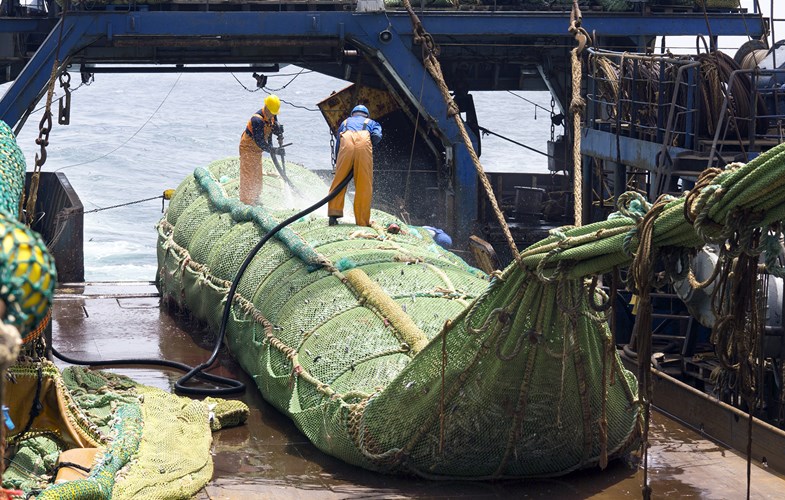

Sharkproject is an accredited observer to ICCAT & IOTC and a member of the NGO Tuna Forum.
Demand to the RFMOs
Fins Naturally Attached and improved monitoring of the finning ban in all RFMOs – not the only step, but an important one for improved shark protection.
If not now, then when?
The importance of finning for shark conservation
Shark populations worldwide are on the brink of collapse under pressure from overfishing. An estimated 63 to 273 million sharks are killed each year. More than half (16 out of 31) of oceanic shark species are now classified as endangered or critically endangered, and recently published data show that the global population has declined by 71% since 1970, due to an 18-fold increase in fishing pressure. The collapse of shark populations also has far-reaching consequences, as sharks are known to play an important role in maintaining balanced and functioning ecosystems and contribute to marine carbon sequestration, which can help mitigate climate change.
A major reason for shark exploitation is the highly lucrative global market for their fins, with many shark species particularly vulnerable due to their slow growth, low reproductive rate, large-scale overlap with fishing areas and the value of their fins. A key element in protecting shark populations is therefore the abolition of the inhumane and unsustainable practice of 'finning', where the animal's fins are cut off on board fishing vessels and then the animals, often still alive, are thrown back into the sea. Shark finning is not only a wasteful and cruel practice, but also prevents effective fisheries' management, as neither the actual numbers nor the species caught can be accurately determined.
Solutions
Against this backdrop, many countries (including the USA, the UK, the European Union, Canada, Australia and South Africa) and all major RFMOs have banned shark finning at sea, although they use different methods to implement their bans, which vary significantly in their effectiveness and enforcement.
Some countries rely on a fin-to-body ratio that allows fishermen to remove shark fins at sea as long as the total weight of fins landed does not exceed a certain percentage of body weight. There are a number of loopholes in this approach, as, for example, the weight ratios of different species and the methods used to remove fins vary considerably from fleet to fleet. The ability to separate fins from carcasses also opens up the possibility of "high-grading", where fishermen combine higher-value fins with smaller sharks that take up less space in the hold.
Another approach is to attach the fins artificially: The fins can be cut off but have to be reattached to the body, e.g. with a rope or wire or together with the body in a bag. This approach not only has many of the loopholes mentioned above, but is also considered impractical, too complicated and too expensive for fisheries with large catches. The process is costly, labour intensive and generates additional plastic waste.
Fins naturally attached to the carcass - Fins Naturally Attached
In light of the above problems, science and management now agree that the only truly effective means of banning the removal of shark fins is to require that fins be attached. Such a regulation states that fishermen may not land a shark that does not have all fins naturally attached to its body, and that they may not possess, transship or land fins that are not naturally attached to the corresponding body. This avoids the ambiguities and complicated monitoring of other approaches: If fins are discovered separately from the carcasses, it is immediately clear that a violation has occurred and sanctions can be imposed.
Over the past 15 years, a growing number of countries around the world have adopted 'Fins Naturally Attached' policies, including the EU (since 2013), the US (2010), Costa Rica (2006), South Africa (1998) and Canada (2019), as well as several Regional Fisheries Management Organizations (RFMOs). A recent report commissioned by the Marine Stewardship Council (MSC) states, "Over the past decade, there has been a steady move towards an FNA requirement for fisheries that land sharks, and FNA is widely considered 'best practice' not only to ensure that shark finning does not occur, but also to enable fisheries monitoring to reach the level necessary to support adaptive management of these endangered species."
The report found that 19 of the world's top 43 shark-fishing nations have a "Fins Naturally Attached" policy for at least some fisheries under their jurisdiction, representing 90% of the 21 nations that have a finning ban. Given the level of uptake, it is reasonable to assume that "Fins Naturally Attached" is no longer just "best practice" but increasingly a minimum requirement for sustainable fisheries management.
The situation with fisheries management organizations (RFMOs)
Many nations, such as Japan, China, but also New Zealand and many others, are still unwilling to limit profit maximization in the handling of sharks on board their fishing fleets - despite knowing about the threat to these animals and the existing loopholes. They have therefore prevented the adoption of a strict Fins Naturally Attached regulation in all major tuna RFMOs (ICCAT, IAATC, IOTC, WCPFC) until today. Although it is precisely in these RFMOs that sharks are either targeted or are a regular by-catch in tuna and swordfish fisheries. These RFMOs have banned finning per se, but have not adopted any FNA requirement (ICCAT, IAATC) or allow numerous exemptions despite existing FNA regulation (IOTC, WCPFC), so that de facto no fishery is obliged to FNA and monitoring of violations of the ban on finning is almost impossible. Only some smaller RFMOs, such as NAFO and GFM, have so far introduced a comprehensive FNA scheme.
Goals
Sharkproject is committed to the introduction of Fins Naturally Attached - without exceptions, in all RFMOs.
Worldwide, EU
- Sharkproject is an accredited observer of ICCAT (International Commission for the Conservation of the Atlantic Tuna).
https://www.iccat.int/en/ - Sharkproject is an accredited observer at the IOTC (Indian Ocean Tuna Commission)
https://iotc.org - Sharkproject is a member of the NGO Tuna Forum
https://ngotunaforum.org
Duration
Until all RFMOs in which we are involved have introduced a mandatory FNA regulation for all their members and have also implemented its monitoring.
All members of the NGO Tuna Forum and many other marine conservation organisations involved in RFMOs.
Links to publications and further information
Threat to the sharks:
https://www.sciencedirect.com/science/article/abs/pii/S0308597X13000055?via%3Dihub
https://pubmed.ncbi.nlm.nih.gov/33505035/
https://ipbes.net/news/Media-Release-Global-Assessment
Fins Naturally Attached Status:
https://www.msc.org/docs/default-source/default-document-library/stakeholders/best-practice-in-the-prevention-of-shark-finning-report.pdf?sfvrsn=3f26ac1c_4
Report on Fins Naturally Attached:
https://www.sharkproject.org/wp-content/uploads/2021/02/Analyis-of-the-Marine-Stewardship-Councils-policy-on-shark-finning-February-2021.pdf
Project history
March 2020 - Accreditation with IOTC
April 2020 - Membership of the NGO Tuna Forum
September 2020 - Accreditation with ICCAT
September 2021 - Publication of our position paper on fisheries reform, including the call for Fins Naturally Attached for all fisheries.
November 2021 - Statement to ICCAT calling for the introduction of Fins Naturally Attached.
